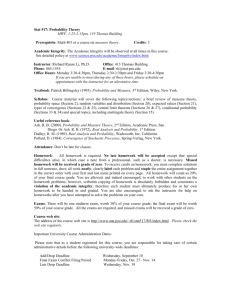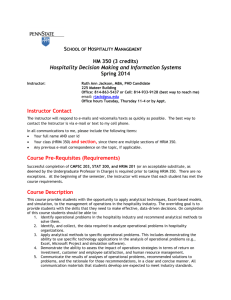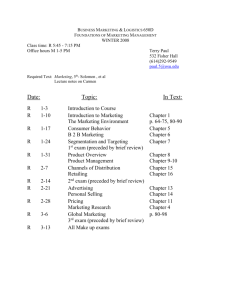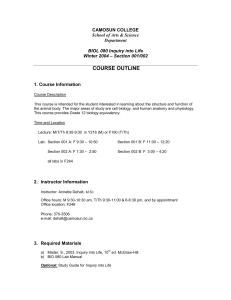HRIM 350 Syllabus - Ruth Ann Jackson Teaching Portfolio
advertisement
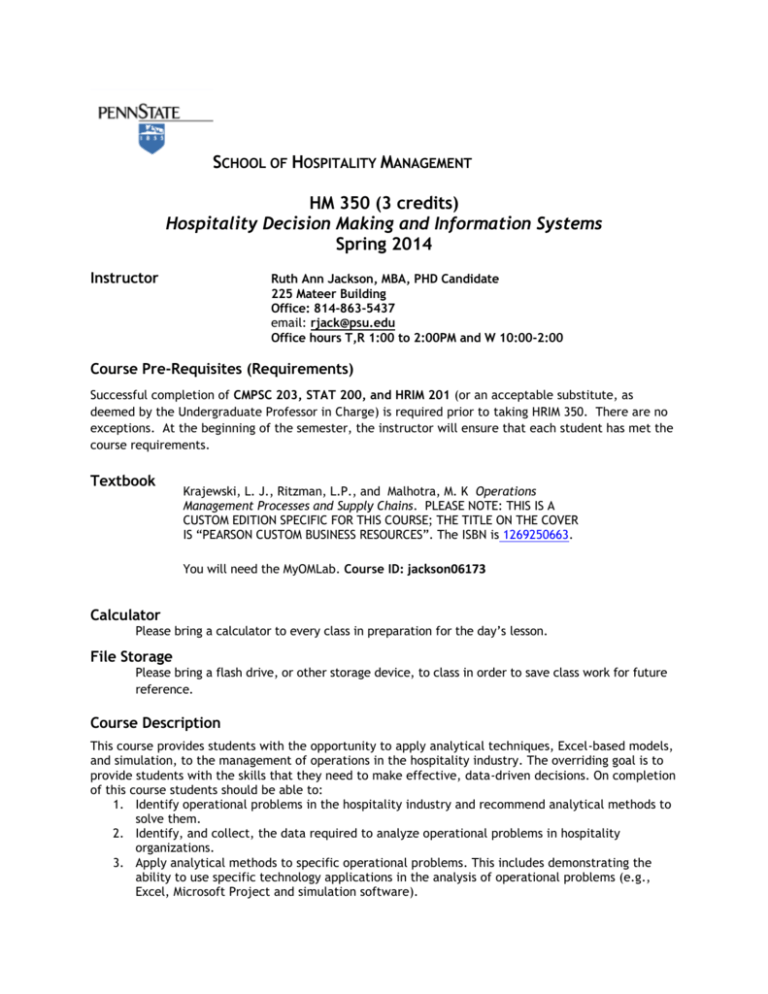
SCHOOL OF HOSPITALITY MANAGEMENT HM 350 (3 credits) Hospitality Decision Making and Information Systems Spring 2014 Instructor Ruth Ann Jackson, MBA, PHD Candidate 225 Mateer Building Office: 814-863-5437 email: rjack@psu.edu Office hours T,R 1:00 to 2:00PM and W 10:00-2:00 Course Pre-Requisites (Requirements) Successful completion of CMPSC 203, STAT 200, and HRIM 201 (or an acceptable substitute, as deemed by the Undergraduate Professor in Charge) is required prior to taking HRIM 350. There are no exceptions. At the beginning of the semester, the instructor will ensure that each student has met the course requirements. Textbook Krajewski, L. J., Ritzman, L.P., and Malhotra, M. K Operations Management Processes and Supply Chains. PLEASE NOTE: THIS IS A CUSTOM EDITION SPECIFIC FOR THIS COURSE; THE TITLE ON THE COVER IS “PEARSON CUSTOM BUSINESS RESOURCES”. The ISBN is 1269250663. You will need the MyOMLab. Course ID: jackson06173 Calculator Please bring a calculator to every class in preparation for the day’s lesson. File Storage Please bring a flash drive, or other storage device, to class in order to save class work for future reference. Course Description This course provides students with the opportunity to apply analytical techniques, Excel-based models, and simulation, to the management of operations in the hospitality industry. The overriding goal is to provide students with the skills that they need to make effective, data-driven decisions. On completion of this course students should be able to: 1. Identify operational problems in the hospitality industry and recommend analytical methods to solve them. 2. Identify, and collect, the data required to analyze operational problems in hospitality organizations. 3. Apply analytical methods to specific operational problems. This includes demonstrating the ability to use specific technology applications in the analysis of operational problems (e.g., Excel, Microsoft Project and simulation software). 4. Demonstrate the ability to assess the impact of operations strategies in terms of return on investment, customer and employee satisfaction, and human resource management. 5. Communicate the results of analyses of operational problems, recommended solutions to problems, and the rationale for those recommendations, in a clear and concise manner. All communication materials that students develop are expected to meet industry standards. The main topics addressed in this course include: Productivity Decision making Process strategy Project management Total quality management Process analysis and design Forecasting for operations management The content of this course is considered fundamental for anyone in hospitality management and, therefore, is required of all School of Hospitality Management majors. Prior to this course, students are required to have taken a course in computer programming with business applications, as well as a course in elementary statistics. This course is a pre-requisite to financial management and marketing courses in the curriculum. Assessment methods may include field reports, homework assignments, reading assignments, case-based group projects and examinations. Relation to other HM Courses This course provides a toolkit of qualitative and quantitative information for hospitality decisionmaking. This course provides a basis for advanced work in finance (HRIM 435), marketing (HRIM 442), and strategic planning (HRIM 490), as well as other courses where hospitality students make decisions using various inputs. Course Requirements 1 Exams Three exams will be administered—two exams during the semester and a cumulative final exam. The exams will cover material presented in the text, homework, and class sessions. The exams will be closed-book and closed-note. The format may include multiple-choice, true-false, fill in the blank, short answer, computational and essay questions. Exam 1 will contribute 25% toward your final grade. Exams 2 will contribute 25% toward your final grade. The cumulative final exam will contribute 30% toward your final grade. You are expected to take exams as scheduled. Failure to do so will result in a zero. However, under exceptional circumstances make-up exams will be permitted. A new and alternative exam will be written for this purpose, and the content and format may differ from the original exam format. Makeup exams will only be granted when all three of the following conditions are met: 1) the student notifies me within 24 hours of the scheduled exam time; 2) the circumstances are extenuating; and 3) the student presents proof of the extenuating circumstances. 2 Homework Assignments These assignments are found and submitted on your MyOMLab. All Homework assignments are due on Fridays by 11:00PM. It is expected that ALL homework will be original and completed independently. Homework’s can take up to 6 hours to complete. Homework assignments will contribute 10% to your final grade. 3 Reading Assessment Quizzes These Quizzes are found and submitted on your MyOMLab. All Reading Assessment Quizzes are due on Tuesdays by 2:00PM. It is expected that ALL work will be original and completed independently. Reading Assessments will contribute 10% to your final grade. 4 Attendance Because an active learning environment is extremely important to development and learning, you are expected to participate during class. While class attendance does not ensure active participation, it is a necessary condition for such. Accordingly, you are expected to attend all classes and be fully prepared to participate. Each student will be allowed three absences. One percentage point will be deducted from your final grade for each absence beyond the three absences allowed. Attendance will be taken at the beginning of class. Any student who arrives to class more than five minutes after the official start of class cannot enter the classroom and will be marked absent for that day, no exceptions. Absent students are responsible to catch up on class announcements, assignments and materials covered in class. Please note: except for medical emergencies (documented properly), there are no make-up opportunities for students absent from class on test or submission days. 5 Time Requirements Students should plan to spend a minimum of 3 hours per week outside of class to meet course requirements. Tentative Course Schedule Note: Your learning is my principal concern. As such, I may need to modify the course schedule as necessary if we need to spend more time on certain topics and/or less time on others. WEEK 1 Course Introduction/Syllabus/Schedule/Expectations Intro to MyOMLab Jan 13-15 Practice Homework MyOMLab due January 16 WEEK 2 -3 Chapter 1 –Using Operations to Compete, read pages 4-6, 8-21. Jan 20-22 Chapter 1 Reading Assessment due Jan 20, 2:00 PM Jan 27-29 MyOMLab Homework 1 due Jan 30, 11 PM WEEK 4-5 Chapter 8 Decision Making, read pages 261-266, 268-270 Feb 3-5 Chapter 8 Reading Assessment due Feb 3, 2:00 PM Feb 10-12 Exam 1 February 12 - Chapters 1 & 8 MyOMLab Homework 2 due Feb 13, 11 PM Chapter 2 - Project Management, read pages 31-52. Chapter 2 Reading Assessment due Feb 17, 2:00 PM MyOMLab Homework 3 due February 27 11 PM WEEK 6-7 Feb 17-19 Feb 24-26 WEEK 8 Chapter 3 Process Strategy Chapter 3 Reading Assessment due March 3, 2:00 PM March 3-5 SPRING BREAK !!!! WEEK 9-10 Chapter 4 Process Analysis Read pages 101-121 Chapter 4 Reading Assessment due March 17, 2:00 PM March 17-19 Exam 2 March 26 – Chapters 3 & 4 March 24-26 Homework 4 due March 27 11PM WEEK 11-12 March 31-Apr 2 Chapter 5 – Quality and Performance. Read pages 141-166 Chapter 5 Reading Assessment due March 31, 2:00 PM MyOMLab Homework 5 due April 10 11PM Chapter 7 – Forecasting. Read pages 217-239. April 7-9 WEEK 13-`15 Chapter 7 Reading Assessment due April 14, 2:00 PM April 14-16 MyOMLab Homework 6 due April 21 11PM April 21-23 Final Exam Review April 28-30 XXXXXXXXXXXXX May 4-8 XXXXXXXXXXXXXXXXXXXXXXXXXXXXXXXXXXXXXXXXXXXXXXXXXXXXXXXX Final Exam : All Chapters XXXXXXXXXXXXX XXXXXXXXXXXXXXXXXXXXXXXXXXXXXXXXXXXXXXXXXXXXXXXXXXXXXXXXXXXXXX Grading Policy ASSIGNMENTS: ALLOCATION TO TOTAL GRADE: Exams Exam 1 February 12 Exam 2 March 26 Final Exam TBD Reading Assessments 25% 25% 30% 10% GRADE SCALE: A 94% A- 90% B+ 87% B 84% B- 80% 77% C 70% Homework 10% C+ Total 100% D 60% F < 60% Adjustments to Course Grades The Instructor reserves the right to lower course grades for any inappropriate and non-professional behavior. This includes, but is NOT limited to: More than 3 unexcused absences during the semester will lower your final grade 1% for each unexcused absence. Late arrival to class Leaving class early Having your cell phone ring during class Text messaging or other social medial in class. Reading the Collegian or other non-HRIM 350 course materials Performing non- HRIM 350 functions on the computers, such as playing games, IM, checking email, or surfing the Web. Academic Integrity Academic integrity is the pursuit of scholarly activity in an open, honest, and responsible manner. Academic integrity is a basic guiding principle for all members of the University community. All students are expected to adhere to the highest standards of academic integrity in the completion of course requirements. If a student is in violation of academic integrity, a sanction can be recommended that may include receiving a failing grade in the course. University guidelines for addressing academic integrity concerns and sanctioning guidelines for offenses can be found at www.psu.edu/dept/oue/aappm/G-9.html. The College of Health and Human Development’s academic integrity policies can be found at hhdev.psu.edu/policies/academicintegrity. Violations of academic integrity include, but are not limited to: Cheating: using cheat sheets, pre-programmed calculators or cell phones, and notes when unauthorized to do so. Copying: looking at another student’s work, passing notes, and exchanging work with another student. Plagiarism: failing to properly cite the work of others referenced in one’s work; copying material directly from the internet; submitting the work of others from journals, papers, or books; submitting another student’s work as one’s own. Tampering: changing one’s own or another student’s work; tampering with the work of another student. Aiding and abetting: facilitating the dishonest work of another student; collaborating on work without authorization; permitting another student to copy one’s work; writing work for another student. Unauthorized possession: selling, buying, or stealing exams or other course materials; failing to return exams on file or reviewed in class; possessing an exam without an instructor’s permission. Submitting previous work: submitting any coursework that has been previously submitted for credit in another course without the knowledge and permission of the current course instructor. Ghosting and misrepresenting: taking an exam or performing a class assignment in place of another student or having another student do the same in one’s place; signing in as present in class for another student or having another student do the same in one’s place. Altering graded work: changing incorrect answers and seeking favorable grade changes; asserting that the instructor made a grading mistake in such instances. Diversity Diversity is broadly defined as “human differences,” including differences in age, disability, ethnicity, gender, immigrant status, race, religion, sexual orientation, social class, and veteran status, among others. In the School of Hospitality Management, we strive to demonstrate our appreciation and commitment to the breadth of individual diversity. Accordingly, all individuals are expected to be open to each other’s ideas and treat everyone with dignity and respect in this course. Students with Disabilities Penn State welcomes students with disabilities into the University’s educational programs. If you have a disability-related need for reasonable academic adjustments in this course, contact the Office for Disability Services (ODS) at (814) 863-1807 (V/TTY). Please visit the ODS website for more information at http://equity.psu.edu/ods/. In order to receive consideration for course accommodations, contact ODS and provide documentation (see the documentation guidelines at http://equity.psu.edu/ods/guidelines/documentation-guidelines). If the documentation supports the need for academic adjustments, ODS will provide a letter identifying appropriate academic adjustments. Please share this letter and discuss the adjustments with me as early in the course as possible. Educators Code of Conduct Details about the Principles of Ethical College and University Teaching can be found at www.gradsch.psu.edu/facstaff/tethics.html. Should a student experience conduct that is inconsistent with ethical conduct, the student is encouraged to first address the issue with the instructor. Should this attempt fail to resolve the issue, or if the nature of the problem is such that the student does not feel comfortable addressing the issue with the instructor, the student may consult other individuals. These individuals include, but are not limited to, the student’s academic or faculty advisor, professorin-charge of the undergraduate program, and the school director. Emergency Preparedness Information PSUTXT is a service designed to alert the Penn State community via text messages when situations arise that affect the ability of the campus to function normally. Subscribers also can elect to have alerts sent to an e-mail address. Subscription information can be found at http://live.psu.edu/psutxt. Cell Phones Cell phones must be turned off or silenced. If you are using your cell phone in class, you will be asked to leave class for that period. In the event that you are expecting an important call, please see me at the beginning of class.

